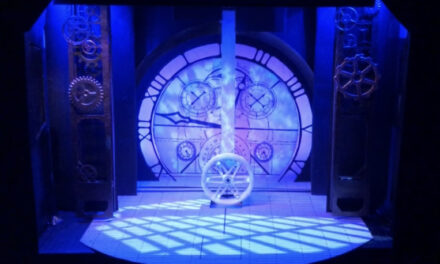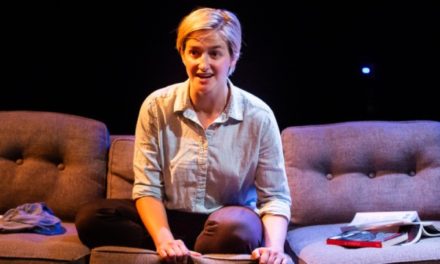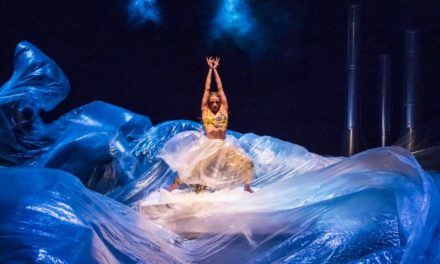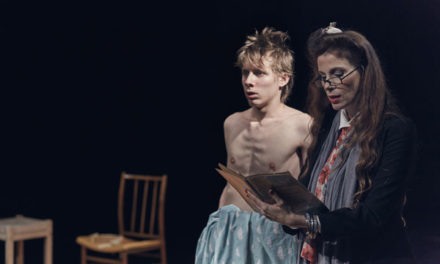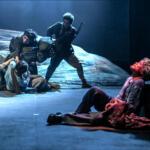I had the opportunity to interview frequent collaborators, writer-director Oscar Barney Finn and actor Paulo Brunetti in a bustling café in the Recoleta neighborhood of Buenos Aires. Both are accomplished theatre artists from Argentina who have enjoyed a lengthy, celebrated collaborative relationship. Two of their most recent projects were presented in Buenos Aires to great acclaim. The first was Muchacho de Luna at the British Arts Centre, based on the writings of Federico García Lorca. The second production was Brutus at Teatro Payró, a retelling of the story of Julius Caesar from the titular character’s perspective. Both productions earned ACE Award nominations along with Paulo Brunetti and Oscar Barney Finn, who won a Best Directing Award.
Jack Wernick: You worked together on two diverse but very intense productions, Muchacho de Luna and Brutus. What was the rehearsal process like? Did you rehearse both plays simultaneously?
Oscar Barney Finn: The work undertaken in 2001 with Paulo Brunetti in development over the last twenty years with different types of proposals that also include passages over time and therefore growth at the acting level and as people who reflect an era. Almost all of them have a common denominator: the theater, that is, a stage. When filming “Sketches around Chekhov,” a co-production between the Film Institute (Argentina’s National Institute of Cinema and Audiovisual Arts) and TV Channel 7 the proposal was moved to a set where Paulo performed one of the protagonists of Chekhov’s The Seagull.
It was interesting to face the challenges of different authors and see the growth of an actor (Brunetti) who began a path with complex texts that meant risks and gave him possibilities within the framework that I created. He had been developing both in cinema and TV and theater.
In those previous steps, works such as Eduardo Rovner’s My Distant Land, Cat on a Hot Tin Roof by Tennessee Williams, and John Patrick Shanley’s Doubt were undertaken. Also, Absolute Power by Roger Peña, which was presented in New York and worthy of awards from critics (New York ACE Awards.) Alternating between productions in Chile and Argentina strengthened the search and reaffirmed us as actor and director. Those texts were the starting point for authentic adaptations that always sought a new perspective.
Jack Wernick: How does working with the same director more than once compare with working with other directors with whom you might not have an opportunity to cultivate the same sort of relationship?
Paulo Brunetti: I worked with three great directors, more with Oscar. Another director was wonderful in classic theater, Shakespeare. But with Oscar we talk for a few minutes, we are saying all the time, “what is next?” I said no to five or six directors because when I read their play it wasn’t right for me. Compared with Oscar, the next role is a dream. I do think it’s good for me to work with another director. In Chile, I worked with three different directors. Good experiences but not like working with him. Working with Oscar is wonderful because you work at the table with the actors for one month, reading, reading, reading. That’s good because you can talk about your role. When you go to the theater for the first time you know the lines. For all his plays you need to investigate another writer because all the time it’s history. So, I love the history with him. In his house he has like 7,000 books, and he reads them all! When you say, “Oscar I need a line from a book by Oscar Wilde when he says blah, blah, blah” and (mimes reaching a book from a bookshelf) he said, “this one.” Another important thing with Oscar when he’s the director all the time he’s with you.
I worked as a director on two plays in Chile. When Oscar went to the premiere in Chile he said, “My job is good for you because the actor was wonderful too,” so for me that was the best compliment. But I love working with him.
Jack Wernick: You wrote Muchacho de Luna alone but collaborated on Brutus. Do you have a preference, writing alone or collaborating with another writer?
Oscar Barney Finn: When we arrived at the proposals for Muchacho de Luna and Brutus and their dramatic and scenic construction, life had given us rich experience that we poured into their creation. The processes were different and although they had been in my imagination for a long time, they took shape at different times. It is also true that authors such as Federico García Lorca and Shakespeare inspired these projects. In 2007, Julius Caesar was considered (for production), but all the ensuing time would have to pass for it to take shape along an unforeseen path because of research and further readings.
I was introduced to García Lorca in secondary school when a literature teacher recommended that I read The House of Bernarda Alba. In 1987 a TV program (Joseph Papp Festival) was broadcast as a tribute to García Lorca on the 50th anniversary of his murder.
Time passed, and much was written about García Lorca. His great biographer Ian Gibson appeared, his sister died, and more texts, letters and works were published. It was not easy to structure what would become a non-stop theatrical event composed of his work without resulting in a didactic biographical rendering but instead what became an emotional journey. At the base was that television broadcast but it went into other areas. Twenty more years had passed and with that great closure I was presented with an opening.
My interest was the dramatic progression of his (García Lorca’s) life and work. Selecting and assembling poetry, letters, songs, and mythical characters from his drama. The moon-death relationship gave me a clear and appealing line and finally provided a structure for the story. The remaining work arose from rehearsals and adaptations to the different settings for each production which presented ongoing challenges. The first production was in a magic theater in Chile (El Teatro Camino in Santiago) in a large space station and the moon passed through the air like a trapeze artist. Then we passed through summer gardens on hot nights and the scenarios varied more in rooms that were solid grounds for experimentation.
Jack Wernick: You have extensive experience acting in film and television as well as onstage. How does preparing to play a character onstage differ from your work onscreen?
Paulo Brunetti: I am an actor for the movies. When I was a kid I’d go to the cinema. Always when I read a book I am thinking all the time about the camera. It’s not the same when I read a play. When I read a play I am thinking, “Is there a role for me?” But when I read for a movie, I see the camera here, there. When I saw “E.T.” the movie I said, “I want to be that kid.” When I came from my city to study theatre, I trained at the Conservatory National Dramatic Art. I started to work, work, work and never stopped so for me it’s wonderful and more with Oscar 23 years ago and we have here in Buenos Aires a premiere and Oscar goes alone. All the people say, “Where’s Paulo?” We go together all the time. It’s the same in Chile. In Chile, we are there from 15 years ago. Oscar worked there too. They call me from schools to go to the theater with the students and after the play there’s a talkback. In Argentina, when I was eight or nine years old for first time I read everything from Lorca. My teacher here in Buenos Aires loves Lorca, and he watched me like 14 times performing (in Muchacho de Luna) and he cried. At the end he said, “It was different the last time.” “Of course. I am different, the play is different.”
Jack Wernick: What inspired you to write a play where Brutus was the main character instead of another character from Julius Caesar, for instance or even from another Shakespeare play?
Oscar Barney Finn: In this case of Brutus, it was different. Our source was history, novels, books, and miniseries. Shakespeare’s work was left aside, and I had no doubt that it should be called Brutus when I learned that author Harold Bloom, a great critic of the Bard, had said that Julius Caesar should be called Brutus. It was at that moment that writer and journalist Marcelo Zapata, a friend for years, joined the project. The writing was not a very long process, and without much time passing the play went into production while we continued writing and modifying the script. This is how a chamber work for seven characters turned out. A challenge, not only because of the text and the look, but because of the asceticism and aesthetics of the setting. From the outset I ruled out (portraying the characters of) Julius Caesar and Mark Antony. They are not even named, although they have the (same) impact they had on historical events. Brutus was the axis and his monologues, if you want, are related to Hamlet, although he has different methodologies. Furthermore, the working process with Paulo Brunetti was different (than for Muchacho de Luna.) In Brutus, he both interacts (with other characters) and has monologues. He has a way of expressing the opposite of Lorca’s interiority. Similar in different intensity in their searches but immersed in a violent and intolerable reality where death hovers. There is intolerance.
Jack Wernick How did the experience of preparing to play each character differ for you? How did having other speaking characters in Brutus influence your work in creating the character of Brutus vs. the character in Muchacho de Luna?
Paulo Brunetti: As an actor I work from here (motions to his heart) not here (points to his head) never. With Muchacho de Luna it was different from all the other plays because when Oscar told me the next (play) is Muchacho de Luna I know the poems, the letters, the plays. I was in Chile, Oscar was here (in Buenos Aires) and he sent this poem so I studied it. He told me no feeling, only study the lines. So, when he and I went to Chile we had a beautiful theater. I start to get the feeling so that was wonderful. I remember when I started to say the lines and I started to cry, cry, cry. I remember when I finished Oscar said, “Stop. You changed. You practiced alone?” It’s the first time I feel the lines. I think (being in) the theater was important. I’m Paulo saying the lines to Rosita. For me that was terrible because I am Rosita too. I cry on a line but tomorrow I cry on a different line. Because the public is different too. The energy is more obvious for you as an actor when you are the only actor on stage because when you’re doing Brutus you’re aware of your audience, but you also have to be more aware of the actors onstage. But when it’s Muchacho de Luna (a play with only one speaking role) it’s more like the audience is the other character that you’re working with.
The difference with Muchacho de Luna and Brutus is I watch the people, I talk with them, and I see the people crying, looking at you. In Brutus, we are seven actors. I started working on Brutus with my voice lower, but Oscar didn’t like that. For me Brutus is Shakespearean, the lines are wonderful. When I read the play the first time I say, “Wow, this is wonderful.” Do you remember the monologue when I have the knife? (The explosive climax of the play.) When I start that line for me that’s the best time of the day as an actor. I was thinking before the premiere maybe it would be difficult working with six actors. I was concerned because my last play (Muchacho de Luna) I was alone. Now it’s seven. I was concerned but it was wonderful. But I’ve worked in many plays with 25 characters or more.
Jack Wernick: How does your background as an acclaimed filmmaker inform your work as a stage director?
Oscar Barney Finn: When the path is long, as I believe mine is, experiences happen without prior notice, and for some it is the product of something thought, sought, and finally achieved. Without a doubt my first experience was writing alone, and the cinema helped me develop it with my first searches. Since my experimental shorts in Paris, I exercised that initial writing with enthusiasm and enjoyment. Then, circumstances caused people to join the journey. Some worked, others didn’t. It all comes down to finding an “equipper” with whom you can tune into some key frequencies of the story and who will help release what is trapped in our unconscious. That happened to me when I started writing with Julia von Grolman, an actress and producer. “Comedia Rota” was a great artistic and life encounter.
Something similar happened to me with Ernesto Schoo, adaptor of some works for TV, and co-writer of “De la Mysterious Buenos Aires.” I think it also depends on the characteristics of the proposal. There are works that enrich their approach with a team as happened with Pepe Bianco’s “Shadows Usually Wear” where Rodolfo Mortola, Ernesto Schoo, and Armando Capalbo investigated an author and a text that was cryptic and not easy to interpret and transfer to a film script. My time as a screenwriting teacher (at the School of Fine Arts at the University of La Plata) strengthened my training and the structure of the script remained ingrained in me and reading a film (script) is always a pleasure.
Visiting the French cinema library (Cinémathèque française) in the 1960s deepened those searches that opened with each new job. A film or TV script is not the same as a dramaturgy proposal, but it is a transition in which these elements can give us some alternatives. Without that knowledge I would not have been able to manage the team of scriptwriters that I had during the two years that the “Lights and Shadows” cycle lasted on Channel 7.
For me it is essential to assume the thematic choice. The first design in which he (Brunetti) stated what he wanted and what path we would take. Everything that comes after will be more attractive and challenging. In short, I think that working together is much more powerful because the collaboration is enriched and dynamic. Perhaps I overthink the texts and particularly the dialogues, seeking effectiveness but also credibility.
I think that from the beginning, in my youth, and perhaps before, in my childhood games, my path was already hinted at, and it became more conscious and defined. There is undoubtedly in those children’s games the seeds of the stage director manipulating objects, of a commanded game in front of my friends, or in primary school performances, or in the creation of a film club to study films and cycles.
This speaks of primary vocations that I nurtured in creative solitude. Without a doubt my training was cinema, but already in Paris I avidly attended the Theater of Nations festival and had wonderful experiences with Samuel Beckett, Peter Brook, Michelangelo Antonioni, Jean Marie Serra, Franco Zeffirelli, and others who helped guide me. That’s why I say that cinema, theater, and literature accompanied me along the way, they became friends, intertwined.
Further circumstances brought me closer to television in a creative and wonderful stage with incredible actors and texts, and finally to the opera where Verdi, Puccini, Menotti, Purcell and so many more were traveling companions. “Everything was sculpted over time,” (quote attributed to filmmaker Andrei Tarkovsky.) This is who I am and who has some personal characteristics in his stories, regardless of the medium he uses. The others, critics, and viewers, talk about constants, styles, looks, aesthetics. Maybe, but I keep searching, not anchoring myself in anything. Recognizing as Albert Camus: “What a man I would be if I had not been the child I was.” Beyond successes and errors, I still think that the future can still hold surprises for me and be much better.
Jack Wernick: Do you have any upcoming projects that you wish to share?
Paulo Brunetti: I am working on my first movie as a director and an actor too. Oscar is in the movie too, playing an opera director with crazy hair. The name of the film is “Nina.” It’s about two men who are married and they’ve lost a little girl. The idea is from me and my best friend in Chile. We have a production company, and we are co-producing with another company. I was talking about that movie with another friend who’s a writer, and he wrote the idea as two men because the first version was a woman and a man. He called me one night and said, “You want a movie because my best friends lost a child?” In Chile, society is very conservative so two men with a child is a strange idea. The child was his (my character’s) biological child. In the film I am talking with (the actor who plays) my husband. We are crying and he said, “I look at you and I see the eyes of the girl.”
It’s my first-time directing a (feature length) movie. I (previously) directed a short film.
(Muchacho de Luna was presented at the British Arts Centre and Brutus was presented at Teatro Payró in June, both in Buenos Aires.)
This post was written by the author in their personal capacity.The opinions expressed in this article are the author’s own and do not reflect the view of The Theatre Times, their staff or collaborators.
This post was written by Jack Wernick.
The views expressed here belong to the author and do not necessarily reflect our views and opinions.


